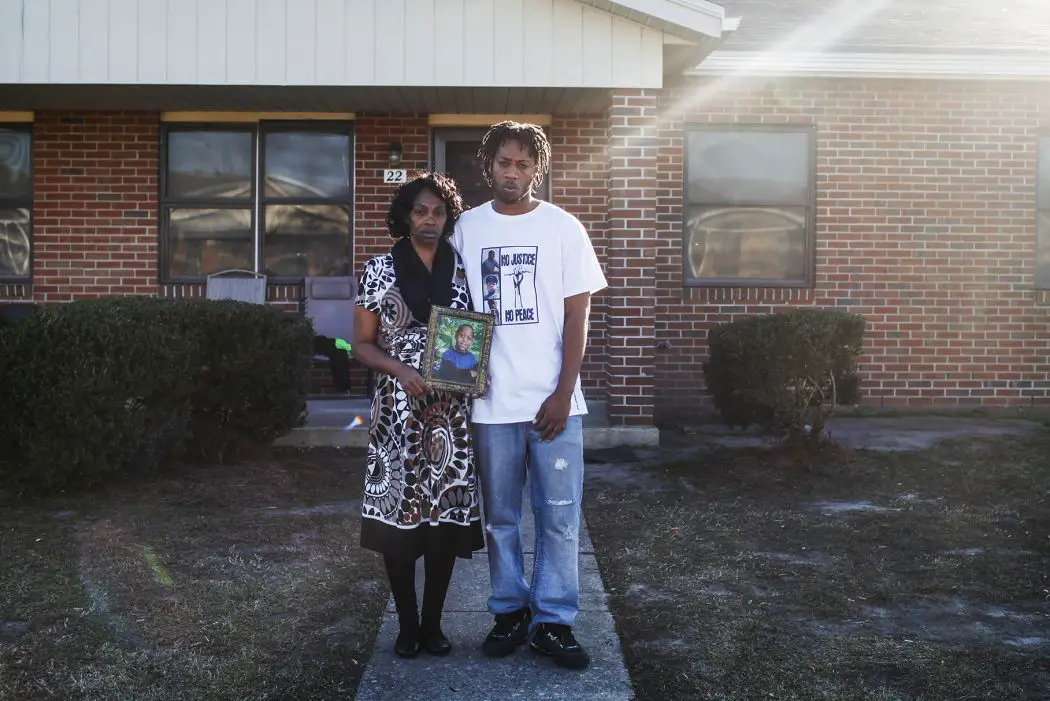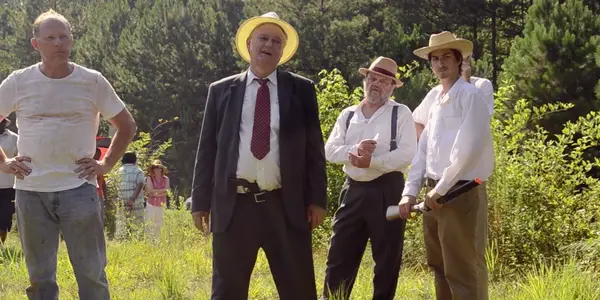ALWAYS IN SEASON: Searching For Truth

Always in Season, the new documentary from Jacqueline Olive, opens with an extremely evocative image—that of clothes on a line, swinging in the wind. What follows is truly stomach-churning: an account of how, in 2014, 17-year-old Lennon Lacy’s body was found hung from a swing and identified by his family, only to be told this horrifying act was, in fact, a suicide. It’s harrowing and infuriating in equal measure, setting the tone for a film in which, it should be noted, viewer discretion is advised.
The Town of Bladenboro
Olive gives us a rundown of the racist history of Bladenboro, the town in which Lacy lived and died, which includes the questionable myth of “the Beast of Bladenboro,” a piece of folklore that prays upon white townspeople’s fears. The denial that fuels racism is clear when a white resident shakes off any notion of “racial division” in Bladenboro, while Olive quietly undercuts his words with a proudly displayed “Blue Lives Matter” sign. This not only provides a link to the film’s second storyline but also demonstrates how racism is baked into the town’s history, making a strong case for Lennon having being murdered and lynched.

We follow Claudia Lacy on her search for justice, from marches in her home town to pleas to the police, and later the FBI. Her frustration is palpable, as the investigation is consistently bungled by those in charge, to the point where suspicion builds over the investigators’ incompetence. It’s here that Always in Season plays as a very effective awareness doc, highlighting the issue at hand while presenting a clear backdrop of how something like this could have taken place. But as it shifts gears into something else entirely, and repeatedly cuts back and forth, things start to get a little muddled.
Reenacting History
The second part of the film concerns an annual reenactment of a famous lynching in Atlanta, and the complex feelings these provocative performances stir up. Cassandra Greene and the other creators putting on these reenactments feel that providing this constant reminder is a necessary measure to prevent history from repeating, while other black residents see it as an act of dredging up the past.
From their perspective, history can be acknowledged without being brought up in such an unsettling manner. But those involved in the reenactments would argue that they’re ensuring history isn’t erased, while sparking discussions many are still uncomfortable having. Not least the white residents who’d sooner ignore their troubling past.
Further complicating the matter is the participation of white residents, many of whom are sons and granddaughters of Klansmen. One is the son of a prominent KKK member, and in his mind, these performances are a preventative measure that also involves owning one’s past. These are vital issues that the doc is raising, but it mostly acts as a primer on many of them instead of really digging deep. Despite good intentions, is the POV of the white participants not worth criticizing? Are there not other ways they could make amends for their fathers and grandfathers, that don’t involve reenacting horrific acts of violence and liberal use of racist slurs? And would any other way be urgent enough, especially considering Lennon’s case?

I’m not asking for definitive answers on the subject, but there’s a whole lot of healthy discussion that the film can’t seem to make time for, largely due to having to cut back and forth between different subject matters. They’re tied together by the larger ideas of lynching and cultural amnesia, but the film’s attempts to tie these disparate threads together results in neither being as fully explored as they should be. This is felt even more as we return to the Lacy’s, and get the sense that there’s more to be explored, just under the surface.
A Botched Investigation
Lennon’s case is littered with red flags—a girlfriend twice his age raises questions, especially when she’s linked to the Lacy’s narcotics-dealing neighbors, who not only displayed hostility towards Lennon but also skipped town shortly after his death. And to complicate things more, the neighbor’s familial ties to the local police open up a never-ending maze of potential questions, whose answers appear intentionally hidden. Despite the film’s strengths at raising awareness for Lennon’s case, the real story seems just out of reach, as it does in the erasure vs provocation debate, and it never really digs deep enough for answers.
Another thread has Danny Glover reciting the harrowing story of Claude Neal, a black man brutalized and lynched in 1934 for crimes he had yet to be tried for. This ties into ideas of white complicity and the mob-mentality of these public displays of violence, which could have slotted alongside either one of the film’s other storylines. But as is, it’s left fighting for space in an already stuffed doc.
Always in Season: Conclusion
Because of the film’s fractured nature, it’s hard not to feel that both halves get shortchanged in the process. But for what it does do—raise awareness for a serious injustice and provoke discussion around the subject of our recent history—Always in Season is a hugely effective piece of work, if an uneven one at that.
Always in Season opens in theaters for a limited run on September 20th. Find a list of screening dates and locations here.
Watch Always in Season
Does content like this matter to you?
Become a Member and support film journalism. Unlock access to all of Film Inquiry`s great articles. Join a community of like-minded readers who are passionate about cinema - get access to our private members Network, give back to independent filmmakers, and more.













